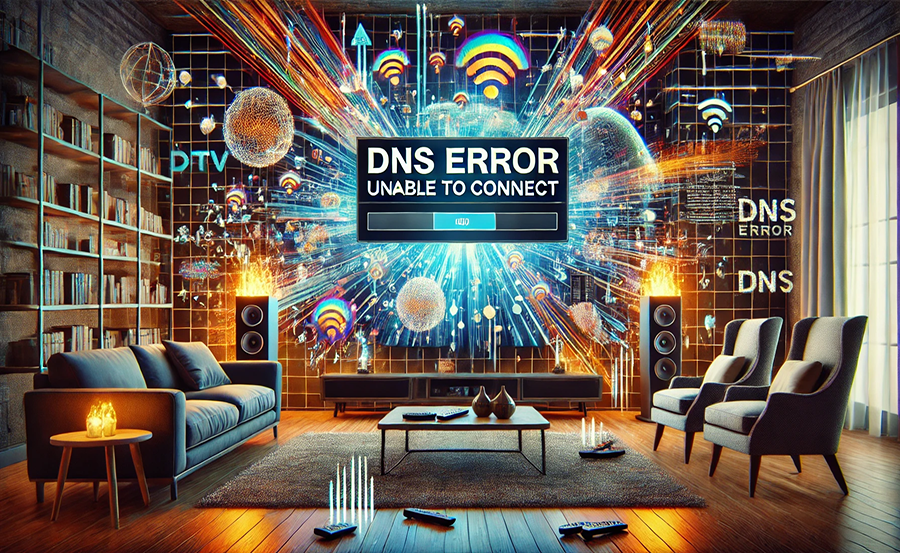The world of IPTV has revolutionized the way we consume media content. With the vast range of channels and the flexibility it offers, it’s no wonder that users are increasingly turning to options like Rapid IPTV to fulfill their viewing needs. However, like any digital service, IPTV is not immune to technical issues. Among these, DNS problems frequently surface as a significant hindrance. Understanding these issues and knowing how to tackle them is critical for maintaining a seamless viewing experience.
Introduction to DNS and IPTV: Why It Matters
DNS, or Domain Name System, is akin to an address book for the internet. It translates domain names into IP addresses, enabling browsers to load internet resources. In the context of IPTV, DNS plays a vital role in ensuring smooth access to streaming services. When DNS issues arise, they can lead to connection failures, buffering, or even the complete inability to access content. Thus, recognizing these problems early and applying effective solutions is essential for any IPTV user seeking optimal performance.
Understanding the Role of DNS in IPTV Streaming
So, why is DNS so crucial for IPTV? Essentially, DNS dictates how quickly and efficiently a request for streaming content is resolved. Any delay or misdirection in this process can noticeably degrade streaming quality or lead to outages. The importance of DNS in delivering on-demand video content cannot be overstated. Top-tier services like Rapid IPTV ensure their DNS configurations are optimized for the best user experience, but users also play a role in managing their personal configurations.
Pro Advice:
Unlock unlimited entertainment with Best IPTV Provider, offering a 1 Year IPTV Subscription to access premium channels and on-demand content.
Common DNS Issues Affecting IPTV Platforms
Various issues can arise from improper DNS settings or configurations. These include, but are not limited to:
- Slow connection speeds.
- Frequent buffering and interruptions.
- Inability to access certain channels.
- Sudden disconnects from the service.
Identifying these issues promptly can make a substantial difference in user satisfaction, particularly for services providing HD IPTV subscriptions.
How to Detect DNS Problems in IPTV Services
Detecting DNS problems can sometimes be straightforward, while at other times they might require more sophisticated troubleshooting. Let’s explore the methods you can use to identify when things are not right.
Checking Connection Speeds and Latency
One of the simplest ways to detect DNS issues is to assess your connection speed and latency. IPTV requires stable and robust internet connections to perform optimally, especially if you’re utilizing a high-definition service like RapidIPTV.
Inspecting Channel Accessibility
Pay close attention to any difficulties accessing specific channels. If some channels load without issue while others fail persistently, a DNS problem may be at the heart of it. This is particularly likely if HD channels demonstrate more issues than standard-definition ones.
Steps to Rectify DNS Problems in IPTV Platforms
Once DNS-related issues have been recognized, applying corrective measures promptly is crucial. Speedy solutions contribute to an unbroken entertainment experience, something all users of premium services like Rapid IPTV desire.
Changing DNS Settings on Your Device
Most DNS issues can be mitigated by adjusting DNS settings. Here’s a general guide on how to proceed:
- Access the network settings on your device.
- Navigate to the DNS settings.
- Replace the current DNS addresses with publicly available options like Google’s (8.8.8.8) or Cloudflare’s (1.1.1.1).
- Restart your device and try streaming again.
This approach often resolves issues like buffering or channel loading failures effectively.
Utilizing a VPN to Improve DNS Performance
Bypass regional restrictions and improve DNS routing by considering VPNs as a solution. A high-quality VPN can often reroute your connection through less congested paths, effectively preventing DNS-related bottlenecks. This method serves doubly well for protecting privacy and enhancing overall IPTV watching quality.
Best Practices for Maintaining Optimal DNS Configuration
Adopting practical strategies can ensure stable DNS performance continuously, enhancing your IPTV experience particularly when leveraging top-tier subscriptions like those provided by Rapid IPTV.
Regularly Updating DNS Settings
DNS services continually evolve. Therefore, updating your DNS settings periodically can help you take advantage of new enhancements. Stay informed about developments from your DNS provider or RapidIPTV, as adopting timely updates can prevent many common pitfalls encountered with outdated settings.
Monitoring for Service Provider Announcements
Providers like Rapid IPTV frequently update users regarding necessary changes or upcoming maintenance. Being aware of these announcements allows users to preemptively prepare or adapt their setups, minimizing disruption. Email notifications, service portals, or dedicated forums are valuable resources for staying in the loop.
Why Rapid IPTV Leads the Market in IPTV Services
Rapid IPTV distinguishes itself in a crowded market by offering top-tier services and support. Their approach to DNS configuration is meticulously developed to ensure seamless streaming experiences.
The Benefits of Choosing Rapid IPTV
Users choosing Rapid IPTV benefit from:
- Strong DNS management practices that reduce outages.
- A vast inventory of high-definition channels to cater to diverse user preferences.
- 24/7 customer support ready to tackle DNS-related queries promptly.
This positions Rapid IPTV as an industry leader, meeting and often exceeding user expectations for a premium viewing experience.
Testimonials and User Experiences
Positive user testimonials reflect the reliability and quality of Rapid IPTV’s service.
“With Rapid IPTV, DNS issues that plagued my old service simply vanished. Their support team walked me through the process, and now it’s smooth sailing,” says Eric, a loyal subscriber.
Wrapping Up: Making the Most of Your IPTV Experience
There you have it—the blueprint to identifying and resolving DNS issues with your IPTV platform. With the right knowledge and tools, such problems can be tackled efficiently, ensuring your viewing experience remains unaffected. And when relying on leaders like Rapid IPTV, users can rest assured that they are subscribing to a service that is not just about viewing content but providing it at unparalleled quality.
Frequently Asked Questions (FAQs)

What is DNS, and why is it important for IPTV?
DNS, short for Domain Name System, is crucial for translating domain names into IP addresses, a necessary process for accessing IPTV streams. DNS affects how quickly and reliably content is streamed to your device.
How do DNS problems manifest in IPTV?
Common manifestations include buffering, inability to access channels, and interrupted streams. These issues indicate that DNS settings may need adjustment.
Can I change my DNS settings to improve streaming?
Yes, altering DNS settings is a practical method to resolve streaming issues. Switching to well-known public DNS options can often improve performance substantially.
Are VPNs beneficial for handling IPTV DNS issues?
VPNs can be very beneficial, as they help sidestep regional restrictions and enhance DNS routing, often resulting in improved streaming quality.
Why should I choose Rapid IPTV over others?
Rapid IPTV shines due to its robust DNS strategies, extensive channel selection, and dedicated customer support, establishing itself as a superior choice for users worldwide.
How often should I update DNS settings?
Regularly reviewing and updating DNS settings is advisable, typically every six months or when notified by your DNS provider or IPTV service of significant changes.
Are there common mistakes to avoid with DNS settings?
Common errors include using outdated DNS addresses or failing to save changes after adjusting settings. Double-check these factors to maintain optimal IPTV performance.
The Environmental Impact of EPG Technology

